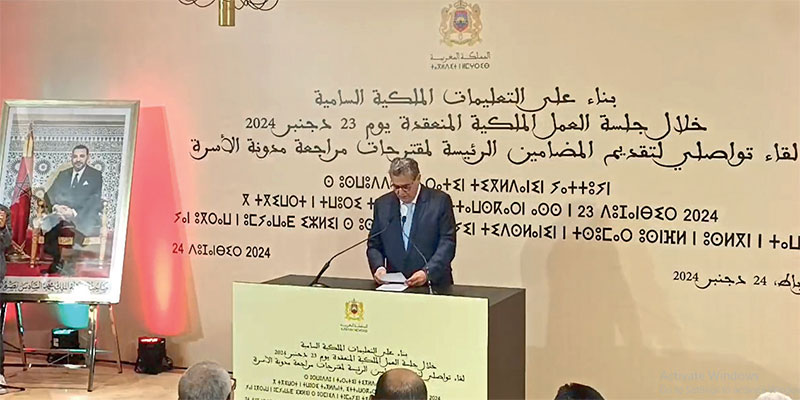Polygamy, inheritance, underage marriage, divorce, child custody… The future version of the Family Code seems as unprecedented as it is bold. Since its last revision in 2004, the family code has raised as much hope, debate, and disappointment. It now appears necessary to meet the expectations of a changing society in an inclusive approach that combines political, religious, academic and civil perspectives.

Announced during a working session chaired by His Majesty King Mohammed VI, this initiative reflects a clear desire: to adapt this fundamental text to the profound social transformations that Moroccan society is going through, while respecting the religious and constitutional foundations of the kingdom.
Consultations
A broad consultation was conducted, involving representatives of the executive and judicial branches, the High Council of Ulemas, and independent human rights bodies. At the end of these consultations, a report was submitted, including 139 proposals aimed at correcting the shortcomings of the current text. Proposals that also lay the foundations for a more harmonious and inclusive society. At the heart of this reform, major adjustments provide concrete solutions to long-debated issues. In terms of inheritance, for example, the new provisions introduce the possibility for ascendants to make advance donations in favor of their daughters. For child custody, the reform establishes an equitable sharing of responsibilities between the two parents, even after a separation. Children’s rights are strengthened by a guarantee of stable housing, in order to preserve their well-being, even in situations of divorce.
Marriage of minors
Regarding the marriage of minors, the legal age is now set at 18 for both sexes, with exceptions strictly limited to young people aged at least 17. These exceptions, supervised by judges, must meet strict criteria. The issue of polygamy, often a source of controversy, is being strengthened. From now on, only exceptional cases, such as infertility or a serious illness of the wife, will be able to justify this practice. In all cases, the prior agreement of the first wife will be required, making polygamy practically impracticable. The sharing of property acquired during the marriage is also changing. The reform fully recognizes the contribution of women, including for domestic tasks, in the constitution of the marital estate. Finally, divorce itself is being modernized. Tools such as electronic notifications simplify procedures, while conciliation mechanisms are being strengthened to avoid unjustified separations. The reform is not limited to legislative amendments. It is accompanied by supporting measures aimed at ensuring its effectiveness. These include the creation of a national register of marriage and divorce contracts, ongoing training for magistrates, and the introduction of a one-stop shop in the courts.
The new reform in 16 points
THere are the main proposals adopted, based on the recommendations of the body and the religious opinion of the Higher Council of Ulemas:
1- Possibility of registering the engagement between the fiances and adoption of the marriage contract as the sole means of proving the marital union, except in exceptional cases where a special procedure may be initiated.
2- Facilitation of marriages for Moroccans residing abroad without the obligatory presence of two Muslim witnesses, in case of impossibility.
3- Setting the legal age of marriage at 18 for boys and girls, with a possible exception for minors aged 17, subject to strict conditions.
4- Obligation to seek the wife’s opinion when signing the marriage contract as to the possibility of remarrying or not, with inclusion of this clause in the contract.
5- Creation of a non-judicial body for conciliation and mediation, intervening mainly in cases of non-consensual divorce.
6- Simplification of procedures for consensual divorce between spouses, without compulsory recourse to legal proceedings.
7- Review of the sharing of property acquired during the marriage, taking into account the wife’s domestic contributions.
8- Introduction of modern electronic means for notifications in divorce cases, while maintaining guarantees for the conciliation stages.
9- Recognition of child custody as a right shared between both parents, even after the dissolution of the marriage, with conditions for the child’s movements.
10- Maintenance of custody of children by the divorced mother, even in the event of remarriage.
11- Establishment of objective and clear criteria for determining alimony.
12- Sharing of legal guardianship of children between both parents, even after divorce.
13- Strengthening the protection of minors’ property and establishing judicial control over the actions carried out by their guardians.
14- Right of the surviving spouse to retain the marital home under certain legal conditions.
15- Opening up the possibility for couples of different religious faiths to transfer property to each other by donation or will.
16- Adoption of modernized legal terminology to replace certain obsolete terms.
Amine BOUSHABA


























